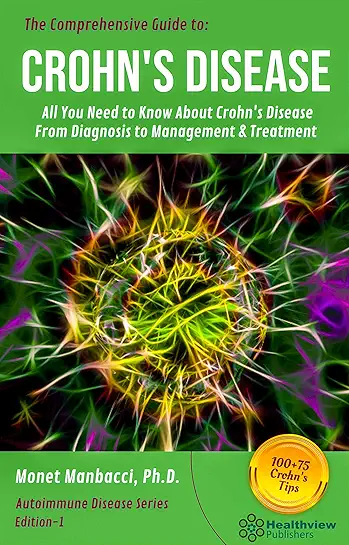
The Comprehensive Guide to Crohn’s Disease
: A Must-Read for Patients and Caregivers
In the ever-evolving world of health literature, finding a resource that comprehensively covers a complex condition like Crohn’s disease can be a daunting task. “The Comprehensive Guide to Crohn’s Disease: All You Need to Know About Crohn’s Disease, From Diagnosis to Management & Treatment (Autoimmune Disease Book 1)” stands out as a beacon of knowledge for patients, caregivers, and anyone looking to understand this autoimmune disorder. This guide promises to equip readers with essential insights into Crohn’s disease, covering everything from its symptoms and diagnosis to effective management strategies and treatment options.
The book begins with a thorough introduction to Crohn’s disease, explaining the underlying mechanisms of this chronic inflammatory bowel disease. It outlines how the immune system mistakenly attacks the gastrointestinal tract, leading to symptoms such as abdominal pain, severe diarrhea, fatigue, and weight loss. The author does an excellent job of breaking down complex medical terminology into easily digestible language, making the content accessible to readers without a medical background. Furthermore, the guide emphasizes the importance of early diagnosis and intervention, providing a detailed overview of the diagnostic process, including the various tests and procedures involved. This foundation is crucial for anyone navigating the challenges of Crohn’s disease, as understanding the condition is the first step toward effective management.
Crohns management strategies
Moving beyond diagnosis, the book delves into the various treatment options available for those living with Crohn’s disease. It covers a wide range of management strategies, from dietary adjustments and lifestyle changes to medications and surgical interventions. The author presents a balanced view of conventional treatments, discussing the benefits and potential side effects of various medications, including corticosteroids and immunosuppressants. Additionally, the guide highlights the significance of personalized treatment plans, encouraging readers to work closely with their healthcare providers to determine the best course of action based on their unique circumstances. This holistic approach to treatment empowers readers, reminding them that they are not alone in their journey and that there are numerous resources and support systems available to them.
While “The Comprehensive Guide to Crohn’s Disease” is an invaluable resource, it does have its pros and cons. On the positive side, the book is well-organized and easy to navigate, with clear headings and subheadings that allow readers to find specific information quickly. The use of real-life case studies and testimonials adds a personal touch, helping readers relate to the experiences of others living with Crohn’s disease. Additionally, the author provides practical tips and advice that can be implemented immediately, such as dietary modifications and stress management techniques, making it a practical guide for everyday life. However, there are also some drawbacks to consider. One potential con is that the book may not delve deeply enough into the latest research and emerging treatment options for Crohn’s disease. While it provides a solid foundation, readers seeking more advanced or specialized information may find themselves wanting more. Furthermore, the guide’s focus on conventional treatment methods might not resonate with those interested in alternative or holistic approaches. This could limit its appeal to a broader audience looking for diverse perspectives on managing Crohn’s disease. In conclusion, “The Comprehensive Guide to Crohn’s Disease” is a well-rounded resource for anyone affected by this challenging condition. Its clear explanations and practical advice make it an essential read for patients and caregivers alike. The book empowers readers to take charge of their health by providing them with the knowledge necessary to navigate the complexities of Crohn’s disease. While it may not cover every aspect of the latest research and alternative treatments, it serves as a solid foundation for understanding and managing this autoimmune disorder effectively. Ultimately, this guide is not just a book; it is a companion for those on the journey with Crohn’s disease. It fosters a sense of community and understanding, reminding readers that they are not alone in their struggles. Whether you are newly diagnosed or have been living with Crohn’s for years, this comprehensive guide can provide valuable insights and support to improve your quality of life. If you or a loved one is seeking to understand Crohn’s disease better, consider adding this essential book to your collection. Conclusion
One Reply to “ The Comprehensive Guide to Crohn’s Disease Review”